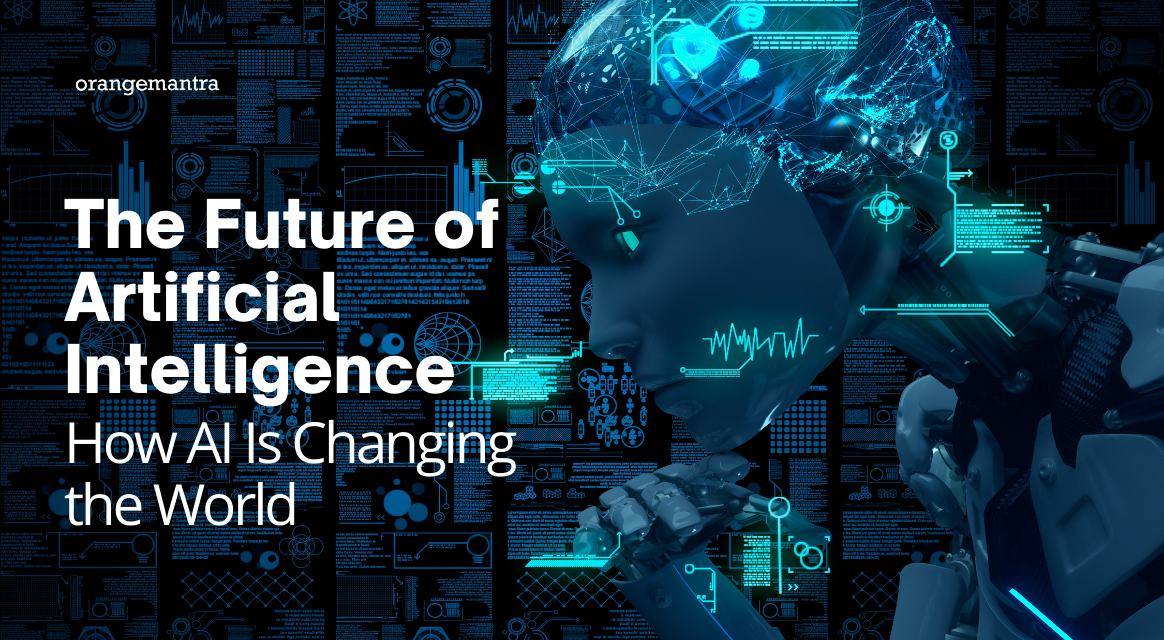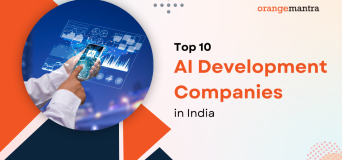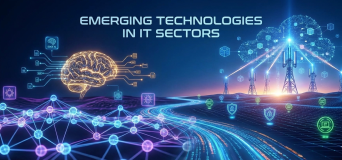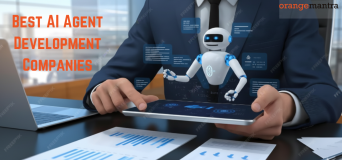
Here’s what you will learn:
As we move ahead with time, AI isn’t coming; it is already here, but yes, in the future, it will continue to become even more advanced. It is taking over everything, as you can see. But this isn’t about robots rising; it’s about how AI will become embedded in every aspect of business, from customer experience to internal ops.
But you must be wondering how AI will affect the future! AI is here, reshaping business and redefining workflows with AI-powered decision-making, as it is already handling routine tasks like customer service chats, data entry, and scheduling. In the future, it will manage entire workflows, make hiring decisions, and optimize supply chains without human intervention. Thus, this boost in efficiency means lower costs and faster turnaround times.
Table of Contents
How AI in Business Transformation Will Shape the Future
Bots, Bills & Beyond: How AI is Automating Everything!
- Available 24/7
- Automates anything you want.
- Turns messy data into smart decisions faster.
- Spot cyber threats early and shut them down.
- Personalizes everything, from marketing to healthcare.
- Speeds up innovation in labs, factories, and offices.
- Boosts sustainability, cutting waste and saving energy.
- Helps leaders make smarter calls, backed by real-time insights.
- Predicts what’s next, whether it’s customer behavior or equipment failure.
-
Empowers AI workflow automation across departments.
-
Fuels AI in business transformation for long-term ROI.
-
Drives Green AI initiatives for sustainable innovation.
A Glimpse into the Artificial Intelligence Future Reshaping Business
The most significant shift that has happened over the past few years is improved business automation. From AI-powered chatbots and virtual assistants to tools for automated invoice processing, they are eliminating manual data entry and so much more. These are one of the most visible future artificial intelligence examples. With the increasing adoption of generative AI development examples, businesses can now automate content generation, design, and communication faster than ever. in business automation. McKinsey’s 2024 survey indicates that 65% of organizations are regularly using generative AI in at least one business function, up from 33% the previous year.
AI’s Long-Term Takeover:
- AI-driven RPA automates order processing, inventory updates, and invoicing.
- Supply chain optimization using ML helps in reducing logistics costs.
- Anticipating equipment failures and scheduling timely repairs with predictive maintenance with IoT + AI.
- AI-based workflow orchestration helps in task coordination across multiple departments.
- Personalized B2B portals that are powered by AI customize dashboards, product recommendations.
- AI chatbots handle tier-1 support queries using NLP and save time.
- AI-powered decision-making tools use real-time data to guide leaders in strategy planning.
The Latest AI Trends, Brought to You by Experts
Remember when spell check felt high-tech? input, and now AI’s grown up a bit since then!!
Generative AI (GenAI)
Just give the data input, and you get new and original content. It can generate everything from written content (like articles or emails) to code, product designs, and even complex artwork. With these, businesses can leverage a lot of benefits, as drafting proposals or designing prototypes can be completed much faster. Generative AI examples are being rapidly adopted in content creation, code development, and digital design across industries.
Edge AI
Rather than relying on cloud-based data centers, it is easy to deploy artificial intelligence directly on devices at the “edge” of a network (e.g., smartphones, sensors, factory equipment). It swiftly integrates without any latency involved in sending data back and forth to the cloud. So, for those who want speed, this Edge AI is very useful. This section highlights Edge AI benefits, especially in latency-sensitive environments like industrial robotics and smart surveillance.
Multimodal AI
This is a cutting-edge form of artificial intelligence that can process and analyze multiple types of data all at once. It does not interpret just one piece of data, but it integrates many and makes sense of all the data. It can also combine visual cues with text data and make sense of the customer interactions, thus making AI more powerful in analyzing the feedback and predicting customer behavior using multimodal AI applications that combine voice, visuals, and written feedback.
Green AI
The aim is to create energy-efficient AI models that reduce the carbon footprint associated with training and running these systems. By optimizing algorithms, processing, data storage, and hardware usage, energy consumption can be significantly reduced. These Green AI initiatives are now being prioritized by eco-conscious enterprises and research centers.
Ready or not, the Artificial Intelligence Future Is Taking Over
Business Automation: The Rise of Intelligent Systems,
Organizations have been shaped by processing, and it can be platforms, the AI-Powered CRM systems, intelligent documentation processing, and all the ML platforms, and AI development services have become a core component of enterprise operations.
Augmentation Over Replacement
AI is proving to be more of a collaborator than a competitor, so people should not fear losing their jobs. Research indicates that while full automation of core tasks remains limited, AI is significantly boosting demand for skilled roles such as data analysts, machine learning engineers, and cybersecurity professionals. This indicates more workplace dynamics.
Navigating Ethical Data Privacy
Transparency and privacy as critical principles as AI models are trained with a lot of data volumes. So, this necessitates clear governance frameworks to ensure that personal data is anonymized and ethically sourced. Businesses comply with the governance to handle data responsibly while delivering innovative services. AI and data privacy are increasingly discussed together as governments introduce tighter compliance laws.
Industry Transformations: AI Across Sectors
- Manufacturing: AI tools are enabling predictive maintenance, quality control, and process optimization, reducing downtime and increasing output.
- Healthcare: AI is transforming diagnostics, drug discovery, and patient monitoring through big data and machine learning models.
- Finance: From fraud detection to real-time credit analysis, AI is enhancing security and improving customer experiences in banking and insurance.
- Education: Personalized learning platforms and AI-driven tutoring tools are changing how students interact with information.
- Media: Newsrooms and content creators are using AI to generate articles, analyze trends, and engage audiences more efficiently.
- Customer Service: AI chatbots and virtual agents are resolving queries, reducing wait times, and learning from each interaction to serve customers better.
- Transportation: Autonomous vehicles, logistics optimization, and AI-powered traffic systems are reshaping mobility and supply thinking at Namdynamics.
Future Artificial Intelligence Transforming Businesses Today
Still thinking of AI as just buzzwords and bots? These B2B tools are proving otherwise—with real results and real ROI.
Salesforce Einstein
CRM workflows get smoother when Salesforce Einstein integrates AI directly into CRM. It automates lead scoring, predicts deal closures, and suggests personalized customer actions. How does it seem possible? It’s through ML models. These models are trained in customer behavior that is useful in shortening sales cycles, but also increases conversion.
IBM Watson
IBM Watson is a cognitive AI platform built to tackle data-heavy environments. It extracts key insights and understands the context. Legal,ive volumes of unstructured data that are processed and interpreted. And is used across the legal, finance, and healthcare sectors in contracts, case files, or medical journals.
AI in Cybersecurity
In 2025, AI in cybersecurity will be critical as threat actors evolve faster than traditional defenses. Network monitoring in real time is possible with many AI-driven cybersecurity platforms. For instance, there are many self-learning AI platforms for threat detection. It automatically neutralizes the threat. Detects novel, never-before-seen attacks using anomaly detection, not just known signatures. Darktrace and CrowdStrike are cybersecurity platforms, making them indispensable in an era of increasingly sophisticated digital threats.
Conclusion
AI is indeed redefining the way we work and make decisions. The artificial intelligence future isn’t just a prediction but indeed, a pivot point. From streamlining workflows to enhancing decision-making and scaling innovation, AI is quietly rewriting the rulebook of modern business. The question isn’t if it will change how we work—it’s how fast you’re ready to adapt.
FAQs
Q1. How does AI affect our future?
It boosts productivity, automates tasks, and transforms industries. It is giving industries like healthcare and finance a serious upgrade.
Q2. How fast is AI evolving?
Very fast advancements in generative, multimodal, and autonomous AI are happening year over year.
Q3. What is the future of AI?
To augment human capabilities, improve decision-making, and power smarter systems across sectors.
Q4. Can AI take over the world in the future?
Unlikely. AI is powerful but still depends on human oversight, ethics, and regulation. Plus, humans are needed to feed it data, train it, and make critical decisions. Without us, it’s just a tool with no purpose.


